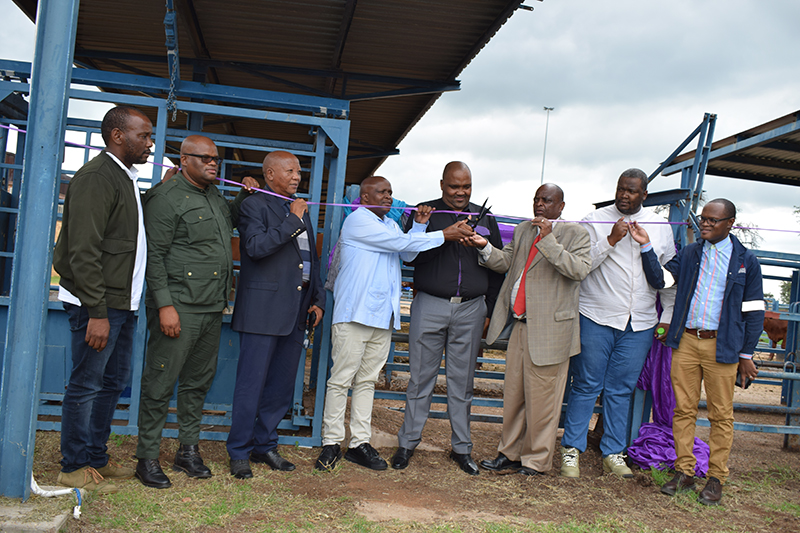By Gofaone Motsamai and Oscar Mosiane
The North-West University (NWU), in collaboration with the Department of Agriculture and Rural Development (DARD), has established an agri-hub to advance agricultural development in North West.
This initiative represents a substantial progression in addressing critical issues such as food security, economic growth and agricultural sustainability in the province. The hub was launched at the university's Molelwane Farm on Monday, 3 March 2025.
At the launch event, Prof Bismark Tyobeka, NWU principal and vice-chancellor, underscored the significant transformative potential of the Agri-Hub, particularly in its ability to drive economic growth, generate employment opportunities and enhance food security.
"This occasion represents a pivotal moment as we observe the realisation of this transformative initiative. We must ensure its success to facilitate our nation's economic development and to align with the United Nations Sustainable Development Goals," said Prof Tyobeka.
He further indicated that while agriculture contributes approximately 2,5% to South Africa's gross domestic product (GDP), substantial potential exists for growth in the sector. This is particularly evident in North West, which accounts for only 7,8% of employment in commercial agriculture.
"This initiative should be recognised as a significant contribution to the Agriculture and Agro-Processing Master Plan, which aims to promote inclusive growth, enhance competitiveness, facilitate transformation and ensure food security. Through strategic collaboration among government entities, academic institutions and private sector stakeholders, we are developing an innovative model designed to transform agricultural production, processing and market accessibility."
A provincial priority for agricultural development
The Agri-Hub is anticipated to play a crucial role in improving agricultural trends in North West. Lazarus Mokgosi, North West premier, emphasised that although agriculture contributes 3% to the province’s GDP, African and black farmers have had limited participation. The Agri-Hub aims to change this by supporting livestock and crop value chains, enhancing research and facilitating market access.
"This initiative aligns with the Provincial Growth and Development Strategy and the Medium-Term Development Plan 2025-2030, both of which prioritise combatting poverty and reducing the high cost of living. The hub will act as a centre of excellence focused on enhancing livestock and crop value chains. It will support farmers through research, technology development, skills training and capacity building," said the premier.
Thupi Mokhatla, department head at the DARD, elaborated on the primary focus areas of the Agri-Hub, which encompass goat massification, crop production and beef farming.
He explained: "This initiative represents our provincial response to the three key priorities established by the Government of National Unity: fostering inclusive growth and job creation, addressing the issue of poverty, and developing a capable and ethical state dedicated to developmental objectives."
Collaboration for sustainable growth
The launch further underscored the critical role of research, innovation and commercialisation in the advancement of the agricultural sector. Prof David Modise, executive dean of the NWU’s Faculty of Natural and Agricultural Sciences, remarked that previous agricultural initiatives had frequently operated in isolation, thereby constraining their effectiveness.
“With the establishment of this hub, we are leveraging our collective strengths and resources to enhance both crop and livestock production. The hub will function as a centre of excellence, providing essential skills and support to farmers and communities, ultimately contributing to sustainable economic growth.”
Prof Modise elaborated on the theoretical foundation of the initiative by referencing value chain development theory, rural livelihood theory and cluster development theory.
“While some farmers possess the capability to produce goods, they often experience challenges regarding market access and lack the academic partnerships required to bridge these gaps. This hub is intended to address these issues by integrating research, innovation and commercialisation,” he said.
At the conclusion of the event, Madoda Sambatha, MEC for Agriculture and Rural Development, underscored the pivotal role of the Agri-Hub in the commercialisation of agriculture, as opposed to solely incubating small-scale farmers.
“This initiative does not serve as an incubation programme. The hub engages with farmers who are already operational, ensuring their preparedness for structured commercialisation. When the Department of Agriculture and the Land Bank provide blended finance, these farmers must be adequately prepared.”
He drew a comparison with the construction industry, where smaller contractors collaborate with larger firms prior to establishing their independent operations. "A process of incubation exists in construction. Grade one contractors partner with grade four contractors until they are capable of functioning autonomously. The agriculture sector should implement a similar principle."

NWU principal and vice-chancellor Prof Bismark Tyobeka cuts the ceremonial ribbon at the Agri-Hub, surrounded by dignitaries.
